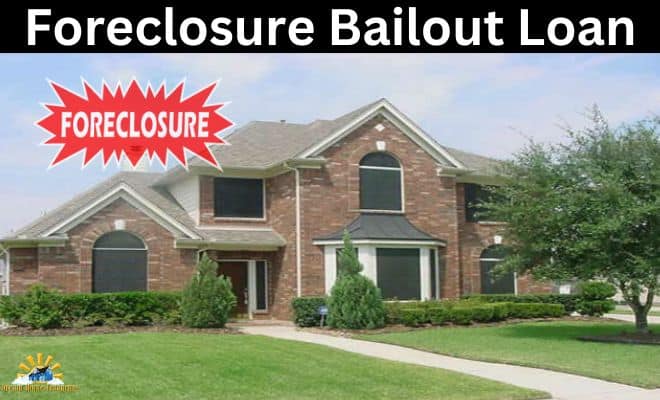Foreclosure Bailout Loan Options
A foreclosure bailout loan is a lifeline provided to homeowners who are facing foreclosure, or who are looking to purchase a home soon after a foreclosure . It’s an option that allows you to refinance your existing loan balance or revive a defaulted loan, potentially stopping an upcoming foreclosure.
To apply for a foreclosure bailout loan, you will need to gather documentation showing your financial situation and the reasons for the foreclosure. It’s advisable to consult with a lender who specializes in these types of loans, as they may have specific requirements such as significant home equity and a minimum credit score.
Real Estate expert Bill Gassett, owner of Maximum Real Estate Exposure, weighed in with this guidance: “Eric, foreclosure bailout loans are an essential lending niche to help individuals to keep their homes during times of financial distress. However, these loans should view them as a temporary fix until a refinance to a traditional loan is possible.”
We have years of experience in helping struggling homeowners to refinance their homes to stop the foreclosure process.
What is a Foreclosure Bailout Loan?
A foreclosure bailout loan is designed to halt a foreclosure by refinancing the entire balance of the existing loan. Bailout loans generally come from lenders who are willing to overlook recent late or missed mortgage payments to provide you with a new mortgage to start over.
These are non-traditional mortgages offered by lenders who often charge higher interest rates because they believe these borrowers might not be able to keep up with payments.
Meanwhile, when you are facing a foreclosure, you have just two options to keep your home. First, you could pay all past due balances which is often not possible and the lender may still proceed with the foreclosure anyway. Your last option is to find a foreclosure bailout loan which we can help you with.
Foreclosure Bailout Loan Key Points
This is what you can expect from a foreclosure bailout loan:
- Higher interest rates than a conventional loan
- No penalty for having missed or late mortgage payments from your prior loan
- Limit to the debt to income ratio
- Ability to qualify without tax returns
- No prepayment penalty so you can refinance in the future
Click to speak with someone about your situation today.
Applying for Foreclosure Bailout Loans
Applying for a foreclosure bailout loan can seem complicated at first, but it is just like any other loan process with some additional specifics that need to be addressed due to the unique circumstances of the homeowner.
Documentation
The first vital step in getting a foreclosure bailout loan is gathering extensive documentation. This typically includes:
- Income verification: Lenders will want to see proof of your income, such as pay stubs, W-2 forms, and tax returns. There are also options for this loan without income documentation.
- Tax returns: Your recent tax returns will give the lender a clear picture of your financial situation.
- Current Mortgage Statement: The lender will ask you to provide a copy of your current mortgage statement
- Property appraisal reports: These reports help lenders assess the value of your property and determine if it meets their requirements.
- Proof of insurance: Every mortgage will also require homeowner’s insurance. We will require you to provide a copy of your declaration page.
This thorough documentation process allows lenders to evaluate both your financial capacity and the value of your property. It helps them understand if you’re in a position to repay the loan and if the property serves as sufficient collateral.
Appraisal and Title Work
Following the documentation stage, an appraisal and title work are conducted to provide further insight into the property.
- Appraisal: This involves a professional assessment of the property’s current value. The appraiser will examine various factors, such as the condition of the property, recent comparable sales in the area, and any unique characteristics that could affect its value.
- Title search: A title search is performed to uncover any outstanding liens or claims on the property. This step ensures that there are no unresolved issues that could affect the lender’s stake in the property.
These steps are important for both the borrower and the lender. For borrowers, an accurate appraisal determines the maximum allowable loan amount for the property, while for lenders, it safeguards their investment by ensuring the property’s value matches or exceeds the loan amount.
Credit Score Requirement
Another essential aspect of securing a foreclosure bailout loan is meeting specific credit score requirements. While traditional mortgage lenders typically seek higher credit scores, alternative lenders providing foreclosure bailout loans may accommodate lower scores.
Lenders generally expect borrowers to have a minimum credit score, often around 620 or higher for this type of loan. Additionally, presenting substantial home equity is usually required. The typical equity requirement is at least 25% of the property’s value. These criteria help mitigate risk for lenders and provide assurance that borrowers have a significant stake in their homes.
Loan to Value Ratio Requirements
We are able to help refinance your home to stop a foreclosure, but the loan to value ratio will be limited. If your current loan balance is very close to the value of the home, you may not have an opportunity to refinance.
The loan to value ratio requirements will vary based upon the following:
- Credit scores
- Property use (primary residence, second home, investment)
- Rate and Term Refinance vs Cash out Refinance
The loan to value ratios can be as high as 80% and as low as 60% depending upon the mix of factors referenced above. Give us a call to discuss so we can help you to find a way to refinance. Contact us here to discuss.
Refinancing with Late or Missed Mortgage Payments
One of the challenges when refinancing to stop a foreclosure is most individuals have late or missed mortgage payments. The late or missed payments will disqualify you from being approved for a conventional, FHA, VA or USDA loan.
The foreclosure bailout loan guidelines will allow for the poor mortgage payment history. It is understood that people who are facing foreclosure obviously have mortgage payment challenges. This type of loan may be your only hope in being able to refinance.
The loan can also be used to purchase a new home immediately after your prior residence was foreclosed upon.
Evaluating Foreclosure Bailout Loans
When considering a foreclosure bailout loan, you should conduct a thorough financial assessment. Start by estimating the total cost of the loan, which comprises interest rates, fees, and potential penalties. This is a key step as it allows you to compare the overall expense with your current financial standing and discern whether it aligns with your long-term repayment capabilities.
Assessing the total cost necessitates seeking detailed information about the interest rate associated with the loan. On average, foreclosure bailout loan interest rates are higher than conventional rates. By comprehending this figure, you can calculate the additional payments over time to gauge if they are sustainable within your budget and how it lines up with your current mortgage payment.
Exploring Alternatives to Foreclosure Bailout Loans
When facing the potential loss of your home, it’s important to consider all available options. Loan modification is one such avenue, involving negotiations with your lender to alter the terms of your existing loan, making it more manageable. This could entail reducing the interest rate, extending the loan term, or incorporating missed payments into the loan balance. It’s a suitable approach if you aim to retain your home and can sustain a modified payment plan.
Keep in mind that if your lender already began the foreclosure process, asking for a modification may not work.
Your other alternative is to sell the home and take any equity you may have. Then, you can start over in a new home. If this is the avenue you would like to investigate, we can help guide you and provide you with the financing needed.
U.S Government Assistance Programs
When a homeowner faces the looming threat of foreclosure, the burden can be overwhelming. Fortunately, various government programs are designed to offer financial assistance and stability during these challenging times.
One such program is the Homeowner Assistance Fund (HAF), administered by the U.S. Department of the Treasury. The HAF aims to provide direct financial aid to eligible homeowners who are encountering difficulties in meeting their mortgage obligations due to unforeseen circumstances such as job loss, illness, or other financial hardships. This support enables individuals and families to avoid the devastating prospect of losing their homes.
The HAF operates on the premise that every family deserves a secure and stable place to call home, especially during periods of distress. By offering financial relief, it seeks to alleviate the immediate burden of mortgage payments, thereby preventing avoidable foreclosures and enabling homeowners to regain their financial footing.
** Important note: Although these programs may offer financial assistance, it likely will not stop the foreclosure process from continuing.
Frequently Asked Questions
How does a foreclosure bailout loan help homeowners facing foreclosure?
A foreclosure bailout loan provides financial assistance to homeowners facing foreclosure by allowing them to pay off their delinquent mortgage and save their home. This type of loan can help homeowners avoid the negative consequences of foreclosure, such as damage to credit scores and losing their primary residence. According to recent statistics, foreclosure rates have been steadily increasing due to economic factors impacting homeowner’s ability to pay the mortgage on time.
Are there any alternatives to foreclosure bailout loans for homeowners in financial distress?
Yes, there are alternatives to foreclosure bailout loans for homeowners in financial distress. You can refinance the home and even cash out while in the midst of a foreclosure.
What eligibility criteria do homeowners need to meet to qualify for a foreclosure bailout loan?
Eligibility criteria for a foreclosure bailout loan typically vary depending on the specific program. However, homeowners generally need to meet certain requirements such as minimum credit scores, income, and maximum debt to income ratios. Statistics show that as of 2024, millions of Americans are facing the threat of foreclosure due to the economic downturn, making foreclosure bailout loans an important lifeline for eligible homeowners.
How can homeowners find trustworthy lenders or organizations offering foreclosure bailout loans?
Homeowners can find trustworthy lenders or organizations offering foreclosure bailout loans by conducting thorough research and due diligence. They should seek recommendations from credible sources like financial advisors, real estate professionals, or friends and family who have successfully obtained foreclosure bailout loans. We can help you with your bailout loan so give us a call 732-761-9041 to discuss your options today.
According to a survey conducted by Pew Research Center in 2023, 78% of homeowners who successfully navigated through foreclosure proceedings sought guidance from trusted financial experts in securing reliable foreclosure bailout loans.
What are the potential benefits and drawbacks of taking out a foreclosure bailout loan?
The potential benefits of taking out a foreclosure bailout loan include avoiding foreclosure and saving one’s home, as well as providing temporary financial relief during a difficult time. However, there are also drawbacks to consider, such as the possibility of accumulating more debt and ultimately losing the home if the borrower fails to keep up with the loan payments.
According to recent statistics, about 25% of borrowers who take out foreclosure bailout loans end up re-defaulting within two years, highlighting the importance of careful consideration before opting for this type of financial assistance.


